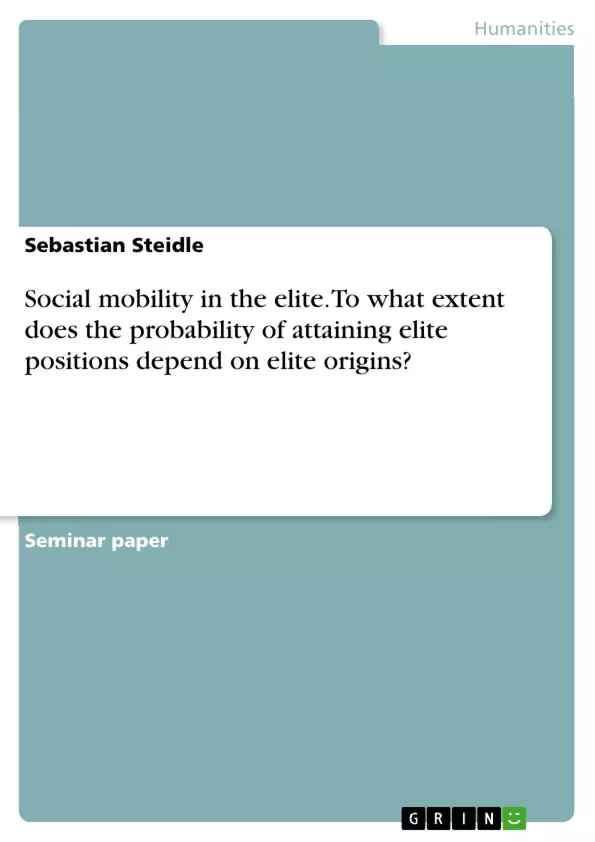Since C. Wright Mills’ “The Power Elite” (1956/2000), questions about the composition and cohesion of the top level of the stratification hierarchy, and also about the mechanisms behind recruitment to this level, have been central. This paper will examine different questions regarding elite recruitment. Firstly, what are the patterns of elite recruitment; does this level consist of separate elites or a common class? Do the different elite groupings vary with respect to degree of openness, i.e. what is the degree of elite mobility? In other words, to what extent does the probability of attaining elite positions depend on social origins, and more specifically, on elite origins?
How important are economical, cultural and social resources for elite recruitment? Is there a development towards more openness or are there trends pointing in the opposite direction?
This issue is important out of several reasons. Since it was observed, that even communist societies develop an extensive elite in form of party officials, it is widely believed, that the existence of some sort of ruling class is unavoidable in a modern mass society. Modern day policy doesn’t lay the focus on the equality of outcome, but on the equality of opportunity instead. In a society with egalitarian values, the existence of an elite must be legitimized over merit and the effectiveness the society aspects from a chosen class. The perception, that elite positions are allocated in an open and fair contest is of normative meaning in a democracy.
Inhaltsverzeichnis (Table of Contents)
- Introduction
- Research
- The Different Sectors of the Elite
- The Money Elite
- The Business Elite
- The Glass Ceiling
Zielsetzung und Themenschwerpunkte (Objectives and Key Themes)
This paper aims to examine the patterns of elite recruitment in Western societies, particularly focusing on the extent to which power is inherited rather than earned through merit. It also explores the implications of elite mobility rates for societal legitimacy and cohesion.
- The composition and cohesion of the elite
- The mechanisms behind recruitment to elite positions
- The impact of social background on elite recruitment
- The relationship between elite mobility and societal legitimacy
- The implications of elite homogeneity for social cohesion
Zusammenfassung der Kapitel (Chapter Summaries)
- Introduction: The paper begins by introducing the concept of elite recruitment and its relevance to the contemporary context, particularly within the framework of democratic societies. It highlights the tensions between meritocratic ideals and the potential for power to be inherited, drawing attention to the importance of understanding the dynamics of elite mobility.
- Research: This chapter explores the conceptualization of elites in sociological research, focusing on the different definitions of the elite and the various sectors that comprise it. It also discusses the challenges associated with quantitatively comparing elite research findings due to the varying scopes of studies and the complexity of defining and measuring the elite.
Schlüsselwörter (Keywords)
The primary keywords and focus topics of this work include elite recruitment, social mobility, power, social stratification, elite homogeneity, ideological cleavages, social cohesion, and the legitimacy of the elite.
Frequently Asked Questions
Does elite status depend on social origin?
Research suggests that while meritocracy is the ideal, children from elite backgrounds have a much higher probability of attaining top positions due to inherited resources.
What is the "Glass Ceiling" in the context of elites?
It refers to the invisible barriers that prevent individuals from lower social classes from reaching the very top levels of power, despite their qualifications.
What roles do cultural and social capital play in recruitment?
Resources like high-level education, social networks, and specific "habitus" are often more decisive for elite entry than purely economic wealth.
Are modern elites becoming more open?
The paper examines whether there is a trend toward openness or if elite circles are becoming more homogenous and self-recruiting over time.
Why is elite mobility important for democracy?
The perception that elite positions are allocated fairly through merit is crucial for the normative legitimacy and social cohesion of a democratic society.
- Arbeit zitieren
- Sebastian Steidle (Autor:in), 2015, Social mobility in the elite. To what extent does the probability of attaining elite positions depend on elite origins?, München, GRIN Verlag, https://www.grin.com/document/334705



